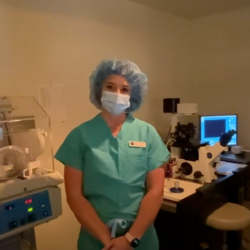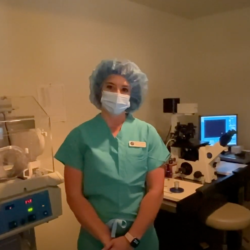
The causes of a failed IVF cycle are complex and depend on a lot of factors. Many causes stem from the natural process of conception, while other risks can be reduced by you and your fertility specialist. Here’s what you should know why in vitro fertilization (IVF) can fail.
1. Poor embryo quality
Most often, a failed IVF cycle stems from issues with the embryo. The embryo may be flawed in some way that doesn’t show up in tests, or it may not develop normally due to chromosomal or genetic defects.
If you experience a failed IVF because of poor embryo quality, it’s almost certainly not because of anything you did or didn’t do. The embryo simply wasn’t viable. This occurs in couples who struggle with fertility, but it also happens in normally fertile couples. Up to 20% of all pregnancies end in a spontaneous miscarriage, but the number may actually be higher since couples not undergoing fertility treatments may not recognize a very early pregnancy loss.
After a failed IVF due to embryo quality, especially in older women, many specialists will recommend preimplantation genetic screening (PGS) that tests the embryos for chromosomal abnormalities prior to the embryo transfer.
2. Egg quality and age
Aging plays a significant role in fertility. The age-related decline in fertility occurs earlier in women than men. Since women are born with their entire egg supply, both the quality and quantity of remaining eggs in the ovaries will naturally decline throughout one’s reproductive life. Fertility specialists are able to evaluate a woman’s “ovarian reserve” using a variety of tests.
Some women attempt to avoid the risk of aging on their future fertility by freezing eggs. If your fertility specialist retrieved far fewer eggs than expected, they may reconsider the medications used in the stimulation process or discuss the options for using donor eggs.
3. Poor ovarian response
Similarly, women who don’t produce multiple eggs or produce poor quality eggs may have issues that stem from a poor ovarian response. This may be more likely if:
- You are over 37
- Have high FSH (follicle stimulating hormone) levels
- Have low AMH (antimullerian hormone) levels
If this occurs, your doctor will work closely with you to vary the amount or type of fertility medications you’re taking in order to improve your overall ovarian response.
4. Implantation dysfunction
An unsuccessful IVF cycle may also occur if the embryo is unable to properly attach to the uterine lining. As noted, this may occur with a nonviable embryo or due to issues of the uterus itself.
A thin endometrium (the lining of the uterus) may lead to lower implantation rates. Abnormalities within the uterus such as polyps or fibroids may also cause problems. In our earlier post, we discuss some ways your doctor can manage fibroids to help with fertility.
Get help
If you’ve had difficulty conceiving or had a failed IVF cycle, we’re always here to help. At The Fertility Institute of New Orleans, we’ve been making dreams come true since 1976 and have achieved almost 18,000 pregnancies (as of August 2018). Contact us today to learn more about your options.



